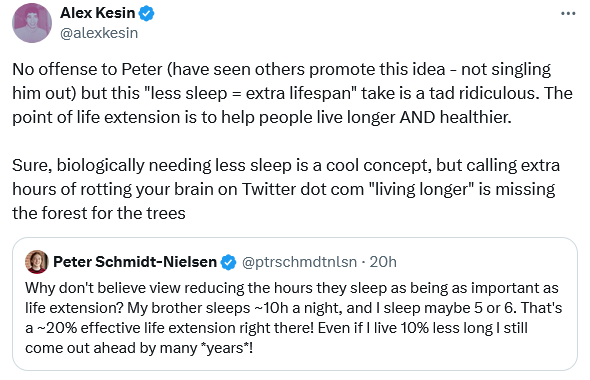I’ve been thinking recently - everything we do has some cost, whether financial, time or opportunity cost. I assume for most of us the thing we wish for is more time, i.e. more days, months and years alive. I have been running a few numbers and thought it would make an interesting discussion topic.
A solid recommendation for exercise is 150 mins/week, which is 18.571 days per year, or 5.1% of each year spent exercising (not including preparation, travel time etc). So, by the crudest metric, exercise needs to extends lifespan by 5.1% just to break even on the time you spent doing it. Or, it needs to provide benefits in terms of healthspan and quality of life that are worth spending 5.1% of your time.
For sleep, let’s take 8 hours as the ‘optimal’. A lot of people sleep 7 hours, thus getting a clear benefit of an extra 1 hour per day of conscious waking time to do things. In context that’s a massive 4.2% extra time. If you slept only 6 hours you would net an extra 8.4%. So, if you’re a 6h sleeper, would going to bed 2 hours earlier pay off by providing a benefit of >8.4%? (In fact, considering that time awake is a premium, it would have to be even more).
I found a study (Years of life gained when meeting sleep duration recommendations in Canada - PubMed) that claims meeting the 7-9h/night recommendation gains you +1.2 life years compared to sleeping <6 hours. Another (Sleep Duration and All-Cause Mortality: A Systematic Review and Meta-Analysis of Prospective Studies - PMC) meta-analysis reckons that healthy sleep patterns get you 2.4 to 4.7 extra years. I would assume the life years is already encompassing the impacts of bad sleep on your diet, cardiovascular health etc. Obviously it has some quality of life impact, because being sleepy sucks, makes you grumpy etc. However, it seems that purely from a time basis, sleeping more is a pretty bad ROI and you won’t get that time back.
For Rapamycin, if we take a cost of around $3 USD per mg, and assume 6mg/wk, that’s a yearly cost of $936. Let’s assume an average user starts Rapamycin at 40 and has a life expectancy of 80. (We’ll ignore inflation etc). That’s a total cost of $936 x 40 years = $37,440 USD. If Rapamycin can extend lifespan by 5%, that is 4 extra years, and the cost of buying each extra year is roughly $9,360 (very reasonable IMO). If it can extend lifespan by 10%, the cost is halved.
Pretty interesting, right? Hopefully this stimulates some interesting discussion, and maybe somebody with better maths skills can make better estimates!
